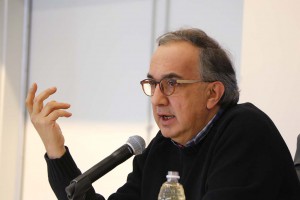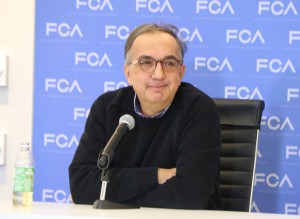Fiat Chrysler Automobiles N.V. plans to re-tool its production base in the U.S.
The broad outline of re-alignment of the production capacity had been included in the company’s new labor pact with the United Auto Workers, which included plans for re-locating production of the ever-popular Jeep Wrangler to a larger plant in Toledo, Ohio.
Sergio Marchionne, Fiat CEO, said he was preparing to reveal the new production plan by the end of January when the automaker released its final financial report for 2017. “There won’t be any plant closings,” said Marchionne, who also insisted that FCA is on track to meet its objective of becoming debt free before the end of 2018 without any kind of merger with another automaker.
Marchionne, who said he now planned to stay on as CEO through 2018, said he was more confident than ever that the company will meet the ambitious financial targets laid out for investors in the spring of 2014 as the Chrysler Group was integrated with Fiat.
The re-alignment of production capacity is designed to keep pace with the rising demand for its vehicles. Parts of the plan have been amended to account for faster growth in the U.S. and the European Union and slower growth in China and Brazil, Marchionne told reporters after a press conference that followed the official unveiling of the Pacifica.
(Reinventing the minivan: Chrysler betting big on the 2017 Pacifica. For more, Click Here.)
Part of the plan includes revising the company’s ambitious ideas for re-launching Alfa-Romeo. With China showing signs of slow down, FCA will revise the Alfa product plan to expedite models that could be sold in North America and Europe rather than China, which had been expected to account for a big share of the brands growth.
Marchionne added the introduction the new 2017 Chrysler Pacifica represented the first vehicle developed “from scratch” by the automaker since it took over the bankrupt Chrysler Corp. in 2009.
The decision to drop the old names long associated with previous generations of minivans, such as Town and Country and Caravan, reflects the fact that the Pacifica has been completely redesigned and incorporates the best available technology to re-create a product that has been vital to FCA U.S. and its predecessors over the past three decades.
The change was made only after extensive internal debate that gathered views from every corner of the company’s headquarters and technical center in Auburn Hills, Marchionne said.
FCA U.S. also commission consumer research to see if the Pacifica name had any negative connotations, Marchionne said. “The results showed that it didn’t, he said.
Timothy Kuniskis, head of Passenger Car Brands, FCA – North America, said the 2017 Pacifica will offer functionality, versatility, technology and bold styling when it comes to market next spring.
As the original creator of the minivan more than 30 years ago, FCA US LLC has transformed the segment with firsts – notching 78 innovations through the first five minivan generations. With the introduction of the all-new Chrysler Pacifica, FCA US adds 37 minivan firsts to its portfolio for an unprecedented total of 115 innovations in the segment.
(To see more about the effort to toughen the standards for crash test ratings, Click Here.)
“The all-new 2017 Chrysler Pacifica is truly a no-compromises minivan, giving customers everything they need or want,” Kuniskis said.
The all-new Chrysler Pacifica was designed and engineered to provide unsurpassed levels of comfort, convenience, technology and functionality, making it the perfect combination for modern families, “he said.
Marchionne also defended the FCA’s overall strategy from critics.
Last year after Marchionne suggested a merger with General Motors, some analysts had suggested that the proposal was a sign that FCA was falling behind in the auto industry’s technical arms race.
Other analysts also suggested FCA could meet the ambitious financial targets that it had laid out in 2014.
Marchionne, however, emphasized that he no longer pursuing a merger with GM or any other automaker said that the analysts were flat out wrong when they dissected his approach to GM.
(End of the road: 20 models headed for the scrapheap. For more, Click Here.)
The fact that the Pacifica will come to market in a key segment with a hybrid options demonstrates that FCA U.S. is capable of building advanced vehicles using own resources.



Based on recent FCA dealer claims of money for inflated sales figures… that road map had better have a company with deep pockets buying FCA soon.